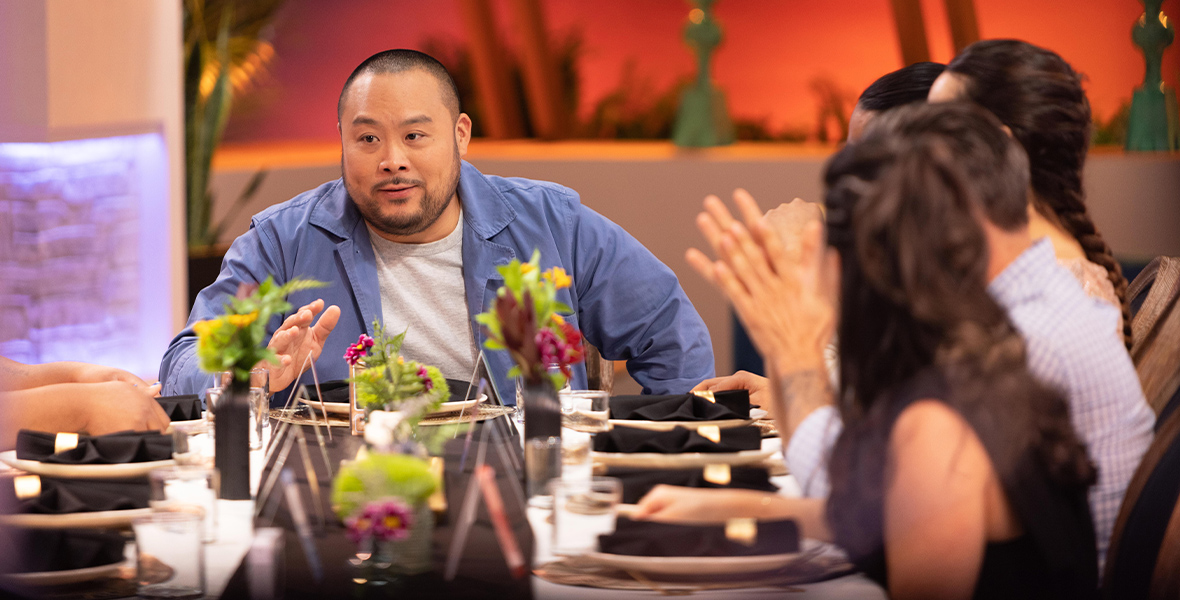By Courtney Potter
Every great cooking competition pits contestants against a panel of renowned judges who decide their fate. But often, a panel can be swayed by the appeals of competitors. What if, for the first time ever, that playing field was leveled?
That’s exactly the idea behind Hulu’s newest competition series, Secret Chef. From executive producer and chef David Chang, it’s a radical twist on a cooking competition—as 10 chefs anonymously rank each other’s food through a series of blind tastings. With their true identities concealed, everything will be hidden, except the one thing that matters most … the food! The series debuts on the streaming service beginning Thursday, June 29.
Recently, D23: The Official Disney Fan Club had the exclusive opportunity to chat with Chang about how the idea for the show came about; how the series is chock full of unexpected moments; what he hopes both the contestants and audience take away from the experience; and so much more. Read on for more…
D23: Thanks for chatting with us, David! What excited you most about the idea for this show—giving the chefs aliases and having them rank each other’s food anonymously?
Chef David Chang (DC): It’s a fresh way of doing a food show—but a food show that wasn’t just about the food. The game theory or game strategy elements to me were very exciting, because it took away the element of contestants trying to get rid of the best cook or eliminate the worst cook.
D23: Was the concept your idea? If it was your idea, how did it come about? Did something specific inspire you?
DC: It was my idea, and I think there were several members of the team who were thinking about doing it too. I thought, let’s do something that’s never been done. I feel like the judges table and having a judge is an unnecessary element. You don’t always need to have someone hovering over you because I think it changes the flow. I think the best critic is yourself. The audience wants to root for the person who is aware enough and is critical of themselves in an honest fashion. Those types of individuals who can do that make compelling television.
D23: You’ve taken a novel approach to cooking shows in the past, with Ugly Delicious, The Next Thing You Eat, and Breakfast, Lunch & Dinner. How do you see Secret Chef “fitting in” with those series, so to speak?
DC: We try to take an angle that hasn’t really happened before. For me, I was trying to change the idea that the winner of the show has to be the very best. Anybody can make delicious food—and I wanted to create a show in which a variety of skill levels were competing against each other. If you saw everybody in the same room, you would know immediately who the novice was and strategize how to eliminate them as soon as possible. Doing it anonymously changes the design of a show, so someone who might not be good but can still make delicious food or cook to a level to get to the next round changes the strategy. Simultaneously, you have really good cooks who have to hide how good of a cook they are and you can’t do that on any other show. Removing the judges and doing it blind changes the strategy, to the point where the only way to describe it is to watch the show.
D23: What was it like watching the contestants acclimate to the hidden-identity aspect of the competition? Did it play out how you imagined? Did anything surprise you about that?
DC: No … it was totally crazy! In the control room, I wish we were filming our reactions because there were constantly things happening that were not expected. It was crazy and I was so shocked. From the first episode to the last, nothing I thought that was going to happen in my mind, happened. I will give you an example: Earlier in the season, we tested a lot of ideas that I’ve had or other producers had in a kitchen. In a professional kitchen, a great partner is someone who can intuitively understand what the next move is just like in a basketball game or football game. In theory, you can write this out but don’t always know how it’s going to play out—so we wanted to do it where each person was partnered but they didn’t know what was in store for them.
The first person wrote a recipe out and was told to make sure they can execute it. They only had 15 minutes to get it started, and they had to leave without contacting their partner. That moment—when you walk into a situation where you have no idea what’s going on—happens in a professional kitchen, but it’s not something I have ever seen at home or on a television program. Being able to work on that idea and give it a shot, and recreate that moment where sauce is boiling over and the oven has a chicken in it—to be able to do that was exciting. To see how it all unfolded was one of the coolest things I have ever been part of because it was way better than anything I could have ever imagined, in terms of the outcome.
D23: Did you have a hand in creating the challenges? Is there one that you couldn’t wait to see the contestants take on?
DC: The two challenges I am thinking of are the TV dinner challenge (where contestants had to recreate a classic TV dinner) because that was difficult to get through. Also, the finale (where the final two chefs had to create a three-course meal with categories chosen by previously eliminated contestants) because structuring that episode was a lot of work and a full team effort. I was watching the finale challenge thinking they should definitely not do dessert and have them do something else, but it doesn’t happen the way you think it’s going to happen. I thought, “Oh wow, that was a surprise.” Those two are the ones I was looking forward to figuring out what those mechanisms would be for the cooks.
D23: Do you have a favorite moment from the making of the series? Something particularly memorable or unexpected?
DC: There are so many. Without revealing too much, I think the ending where people didn’t know who everyone was per se, and not knowing how that reaction was going to be. And seeing the winning reaction, that genuine excitement is something you can’t recreate. Being in that room and to see the emotion happen live is a life changing moment, and being part of that was very cool.
D23: As Secret Chef was shot, what did you hope the contestants would take away from the experience?
DC: I hope the contestants realize they were part of something super special—and this is something that will hopefully continue for many more seasons. They laid down the foundation for what will be a show that everyone will want to watch and continue to watch. Hopefully they can come back again. If they do, it would be interesting to see how you do this when people have a better idea of the game theory and strategy.
D23: …And what do you hope audiences take away from watching the series?
DC: I hope this is a show that everyone can watch. Now that I have kids, it is a show that kids can watch, college students can watch, and grandparents can watch. The show is fun and entertaining and will surprise you because it is not formulaic in the way you expect. At the end of the day, it’s a fun and interesting game show. We were trying to do a food show in a different way, and not just be different to be different—but different to be better.



